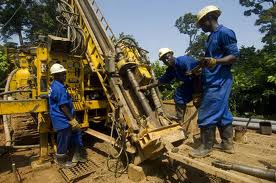Ghana could lose thousands of dollars, in the wake of the prevailing global economic crunch, as a result of a sit down strike by workers of AngloGold Ashanti which began on Wednesday to press their demand for fair wages.
Meanwhile, other workers in the Tarkwa Goldfields have also tied red bands in readiness to embark on a similar action, and would go into action if negotiations currently ongoing between management of the company and the Ghana Mines Workers Union (GMWU) on fair wages failed to yield acceptable results.
Mr. Prince Ankrah, General Secretary of GMWU, confirmed these in an interview with the Ghana News Agency in Accra on Wednesday. According to him, all efforts to get the two companies address salary disparities between Ghanaian workers and their foreign counterparts proved futile.
Mr. Ankrah said the remuneration of AngloGold Ashanti Executives is 289 times higher than the lowest mineworker who risks his life on the job, adding that, in the same vein an executive of Goldfields earns 201 times the income of the lowest paid mineworker.
In AngloGold Ashanti, the salary of the highest paid executive in Ghana is about 340 times higher than the minimum salary of a mine worker who receives 262 dollars per month. The average expatriate receives a salary of 19,586 dollars per month, compared to a Ghanaian senior officer who does the same or a similar job for a salary of 711 dollars per month is. Mr. Ankrah said in AngloGold Ashanti an average rent allowance of 15,000 dollars per annum is paid to top Ghanaian Management staff at Gold House, the company's headquarters in Accra. "Meanwhile, the Management of AngloGold Ashanti continues to drag its feet in our effort to negotiate a fair rent allowance for non-accommodated unionized members at the Obuasi and Iduaprime mine sites" he added. Between 2007 and 2009, some management staff in the industry, including Goldfields and AngloGold Ashanti, have had their emoluments adjusted by 100 per cent, whilst a 24.5 per cent increase demand by unionized workers over a three year period to bring the minimum basic pay of the mineworker to 500 dollars is considered as "outrageous, unrealistic and unsustainable", Mr. Ankrah said. 05 Aug 09
Ghana could lose thousands of dollars, in the wake of the prevailing global economic crunch, as a result of a sit down strike by workers of AngloGold Ashanti which began on Wednesday to press their demand for fair wages.
Meanwhile, other workers in the Tarkwa Goldfields have also tied red bands in readiness to embark on a similar action, and would go into action if negotiations currently ongoing between management of the company and the Ghana Mines Workers Union (GMWU) on fair wages failed to yield acceptable results.
Mr. Prince Ankrah, General Secretary of GMWU, confirmed these in an interview with the Ghana News Agency in Accra on Wednesday. According to him, all efforts to get the two companies address salary disparities between Ghanaian workers and their foreign counterparts proved futile.
Mr. Ankrah said the remuneration of AngloGold Ashanti Executives is 289 times higher than the lowest mineworker who risks his life on the job, adding that, in the same vein an executive of Goldfields earns 201 times the income of the lowest paid mineworker.
In AngloGold Ashanti, the salary of the highest paid executive in Ghana is about 340 times higher than the minimum salary of a mine worker who receives 262 dollars per month. The average expatriate receives a salary of 19,586 dollars per month, compared to a Ghanaian senior officer who does the same or a similar job for a salary of 711 dollars per month is. Mr. Ankrah said in AngloGold Ashanti an average rent allowance of 15,000 dollars per annum is paid to top Ghanaian Management staff at Gold House, the company's headquarters in Accra. "Meanwhile, the Management of AngloGold Ashanti continues to drag its feet in our effort to negotiate a fair rent allowance for non-accommodated unionized members at the Obuasi and Iduaprime mine sites" he added. Between 2007 and 2009, some management staff in the industry, including Goldfields and AngloGold Ashanti, have had their emoluments adjusted by 100 per cent, whilst a 24.5 per cent increase demand by unionized workers over a three year period to bring the minimum basic pay of the mineworker to 500 dollars is considered as "outrageous, unrealistic and unsustainable", Mr. Ankrah said. 05 Aug 09
